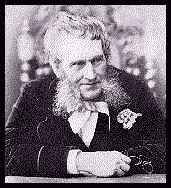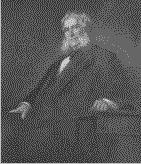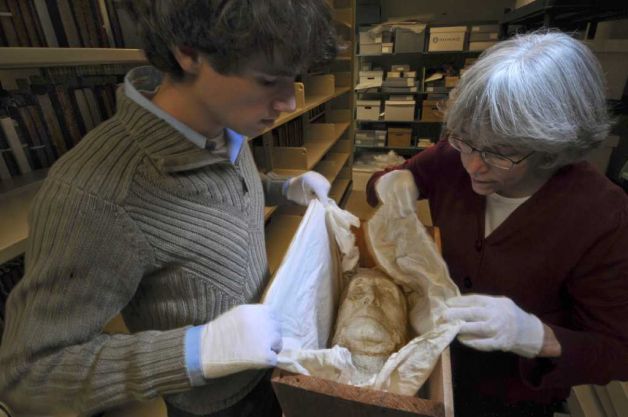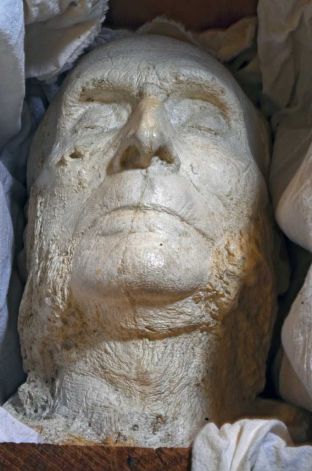JOHN BIGELOW OF UNION
Page 5

Forgotten First Citizen
# 16312.74 John7
Bigelow, son of Asa6(
David5, David4,
John3,
Joshua2,
John1)
and Lucy (Isham) Bigelow, was born at Malden-on-Hudson, Ulster, NY on
25
November 1817. He is known as "The Forgotten Citizen" as he had an
outstanding
career as a lawyer, editor, appointed by President Lincoln to be Consul
at Paris (1861); in 1864 from Charge d'Affaires to Envoy Extraordinary
and Minister Plenipotentiary to the Court of Napoleon III.
A wordsmith gets his due
Papers of 19th-century Union College
grad who went on to fame and died in 1911 to be shown by school
By PAUL GRONDAHL, Staff writer
Published 11:31 p.m., Thursday, December 15, 2011
Annette LeClair, librarian and head of
technical services for Union College's Schaffer Library, right, and
digital projects assistant Matthew Connolly, left, unwrap a plaster
death mask from 1911 of Union College graduate John Bigelow, in the
Special Collections storage area of the library on Tuesday Dec. 13,
2011 in Schenectady, N.Y. Bigelow was a founder of the New York Public
Library, consul general to Paris for President Abraham Lincoln and a
friend to Charles Dickens and other literary figures. An exhibit
marking the centennial of his death begins in the library on Dec. 19.
(Philip Kamrass / Times Union )
SCHENECTADY — John Bigelow transferred to Union College as a junior in
1834 and quickly established himself as one of the nerviest, wordiest
and brightest students on campus. He was a bookish fellow who grew
extravagant side whiskers and hunkered down among the library stacks.
Itching for an intellectual tussle, he engaged his volatile disposition
in heated arguments about literature, philosophy and politics of the
day with classmates, professors and even the president.
When he didn't receive any honors at
commencement, he left town in a fit of pique. Success apparently healed
young Bigelow's wounded ego on his way to becoming a protean figure in
19th-century American letters. Bigelow built an illustrious career as a
lawyer, a prolific author and editor; and co-owner of the New York
Evening Post with poet William Cullen Bryant. He was President Abraham
Lincoln's minister to France during the Civil War, a founder of the New
York Public Library, a political operative and a bon vivant who
befriended presidents and literary lions.
On Monday, to mark the centennial of Bigelow's
death on Dec. 13, 1911, at age 94, Union College librarians are
honoring the notable alumnus with a display of some of the 4,000 books
from his personal library and 20,000 letters descendants donated to his
alma mater. At 80 linear feet, it is the largest collection of
correspondence and materials ever given to Union since the school's
founding in 1795. It rivals the volume of the Bigelow papers at the New
York Public Library.
Under the direction of systems librarian David
Fuller and the aid of student interns, the entire collection of letters
is being digitized in a searchable database that is expected to go
online in February. An event will be planned around the database
unveiling. They'll invite Bigelow family members, who still live in
Bigelow's mansion in Highland Falls, near West Point. Bigelow also had
a townhouse in Manhattan on tony Gramercy Park, a gift from friend
Samuel Tilden.
"Bigelow is an amazing figure who deserves to
be better known," said library Annette LeClair, head of technical
services and a prime Bigelow booster. "The online database will bring
Bigelow into the digital age and to a much wider audience. His family
appreciates our efforts."
The exhibit at Schaffer Library will also include Bigelow's typewriter,
a Blickensderfer 9 made in Stamford, Conn. with an oaken carrying case.
They'll also display a plaster death mask cast of his craggy, angular
face.
Bigelow was a teetotaler and health fanatic
who believed in the curative powers of watermelon. Library staffers
will toast him Monday on the 100th anniversary of his death with slices
of melon. "I've come to admire him for many reasons," LeClair said.
"The array of people who knew him, respected and corresponded with him
is remarkable."
Letters written to Bigelow came from a
constellation of famous writers such as Charles Dickens, Mark Twain and
Henry Wadsworth Longfellow and political figures including Theodore Roosevelt and William
Howard Taft.
"Dear First Citizen," began a Dec. 28, 1909,
letter from Twain, who thanked Bigelow for a condolence letter he sent
after the death of Twain's daughter. "In some future day I shall ring
at your door at 1 o'clock — without previous notice — and claim a
refreshment." He signed it "Sincerely, affectionately S.L. Clemens."
The letters offer windows into pivotal moments
of history, such as the letter that Thurlow Weed, publisher of the
Albany Evening Journal and a Republican political adviser, wrote to
Bigelow after Lincoln was assassinated. "Are we not in the midst of a
Revolution?!! The President Dead," Weed wrote. "I believe that Seward
will survive, but he has suffered through two fearful ordeals."
Bigelow held just two elected positions in his
long career — Secretary of State of New York and Inspector of Prisons
at Sing Sing — but through writing and lobbying he influenced
significant legislation and public works.
Bigelow's fingerprints were all over
maneuvering behind the U.S. acquisition of rights to build a canal
through Panama instead of Nicaragua.
A typed letter marked "personal" from Teddy Roosevelt at the White
House on Jan. 6, 1904, began: "I am so pleased that you liked my
message on Panama," Roosevelt wrote.
The trove of letters have produced a kind of
"Bigelow effect," wowing students who have worked to organize and
digitize them."His letters give you a good sense of what was going on
in political affairs during his lifetime," said Matthew Connolly, who
graduated with a writing degree from Ithaca College in May and who
perused the letters to produce 40 short biographies of Bigelow's
associates for the database.
Bigelow initially was allied with the
Democratic Party and was strongly opposed to slavery. He broke with
Democrats in 1855 when they supported the extension of slavery into
Kansas, and switched parties. He became a savvy Republican Party
operative sent to Paris by Lincoln to sway public opinion and encourage
the French to support the Union blockade of Confederate ports.
LeClair was rendered nearly breathless when
she articulated the qualities she came to admire in Bigelow."He was a
critical thinker with a wide breadth of interests and he also had a
high level of personal integrity," LeClair said. "It sounds kind of
corny, but he was the type of student Union hopes to educate, an
idealistic young person who sees education as a means of service." The
collection includes a volume of Bigelow's diary. The final entry was
dated Dec. 6, 1911, a week before his death. He reminisced about his
time at Union. He looked back not in anger, but in gratitude.
Reach Paul Grondahl at 454-5623 or pgrondahl@timesunion.com.
Bibliography:
Clapp, Margaret A., Forgotten First Citizen: John Bigelow (1947;
repr. 1968).
Howe,Bigelow Family of America; Biographical Encyclopedia of U.S.
Times Union Article

John Bigelow of Union
Modified - 12/21/2011
(c) Copyright 2011 Bigelow Society, Inc. All rights
reserved.
Rod Bigelow - Director
rodbigelow@netzero.net
Rod Bigelow (Roger Jon12 BIGELOW)
Box 13 Chazy Lake
Dannemora, N.Y. 12929
 <
rodbigelow@netzero.net
>
<
rodbigelow@netzero.net
> 
BACK TO THE BIGELOW
SOCIETY PAGE

BACK TO BIGELOW
HOME PAGE







